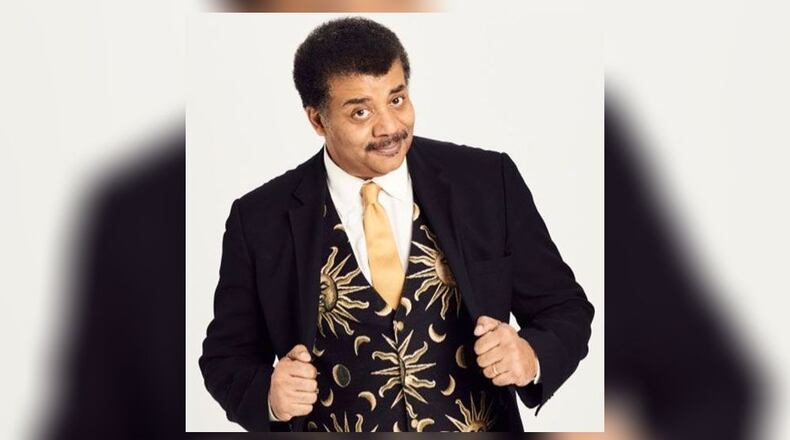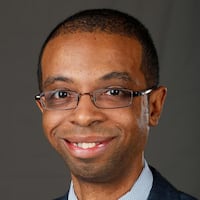The New York City native is also the author of such books as “Death by Black Hole,” “Astrophysics for People in a Hurry,” and most recently, “Cosmic Queries: StarTalk’s Guide to Who We Are, How We Got Here, and Where We’re Going.” In 2017, he earned a Grammy nomination for Best Spoken World Album for “Astrophysics for People in a Hurry.” He has also made cameos on such TV shows as “The Big Bang Theory” and “Brooklyn Nine-Nine.”
Credit: CONTRIBUTED
Credit: CONTRIBUTED
In advance of his arrival in Dayton, Tyson discussed the presentation’s concept and what audiences should anticipate.
Q: What movie inspired you in your youth?
A: “2001: A Space Odyssey.” I saw it in the theater when it came out. People forget it came out a year before we landed on the moon. It had us all dreaming. And I like dreaming. Even though not all dreams come true, some of them become real. And the dreams that become real shape the future of civilization.
Q: What led to the idea of exploring movies within the scientific realm?
A: I pay extra attention to detail that relates to my expertise. And by the way, that’s not weird. For instance, you see a period piece that takes place in the 1950s and maybe there’s a car parked on a curb that’s a 1962 Chevy Bel Air you know shouldn’t be there, you would be complimented for noticing. Or perhaps you see a Jane Austen period piece with a clothing designer and a man appears on screen at a country estate wearing a derby instead of a top hat and the designer notices the derby is out of style for the period they would be complimented. So, I’m noticing the science the way other experts are noticing other things about films.
Q: I gather providing balance was important as you began to plan the presentation?
A: I’m not a Debbie Downer on this subject. There are movies that get it wrong and other movies that get it right. This talk provides a combination of the two. And the movies that get it right are the ones in which you wouldn’t think there is any science in it and there is science in it and they got the science right.
Q: Would you mind providing an example?
A: In the movie “Frozen,” in the song “Let it Go,” one of Elsa’s lyrics mentions “frozen fractals all around.” The word fractal is in a Disney song! Fractal is a very deep mathematical concept. In the talk, I show the scene and go into detail about fractals and how they work and why they matter. I also retell the story of the time I went to director James Cameron to have him change the sky over the sinking Titanic in “Titanic.” I spent 10 years writing letters to him and he finally came around. This talk is a celebration of science that makes it into movies and science that doesn’t make it into movies that should have.
Q: So, you’re not just covering science fiction movies but a broad scope of films?
A: Yes. It’s too easy to talk about science fiction movies. It’s more fun to talk about other kinds of films. I talk about “Stars Wars” and “Star Trek,’ but there is a lot of science in “A Bug’s Life” that you might not have noticed. There’s also a remarkable number of scientific-literate beer commercials I’ll also discuss. This presentation is still a science-based talk, but the movies become joyous reflections of putting science into art.
Q: Do you feel you’re building a bridge between those who love science and those who love arts and entertainment?
A: The people who already know science don’t necessarily need me. But the people who are curious will come for the movies and stay for the science.
Q: What are your thoughts on the state of the film industry?
A: I’m a little tapped out on big budget superhero movies because I wonder if they are taking resources away from other storytellers who have interesting stories to tell about people, places and things. But I like the fact that streaming services on TV have opened up to extraordinary writing and acting talent in miniseries.
Q: What are some of the shows you’ve enjoyed?
A: “The Queen’s Gambit.” There was a time when that wouldn’t have been made. I was also able to catch up on “Mad Men” during the COVID lockdown. I really feel we’re living in another golden age of television.
Q: What do you hope audiences take away from your presentation?
A: I expect that at whatever movie they see next, they will see that movie through a different lens. Perhaps they’ll do some research before or after the movie. Perhaps it will turn the movie into much more of an enlightening encounter of storytelling.
HOW TO GO
What: “Dr. Neil deGrasse Tyson: An Astrophysicist Goes to the Movies”
Where: Schuster Center, Second and Main Streets, Dayton
When: 7:30 p.m. Friday
Cost: $55-$135
Tickets: Call 937-228-3630 or visit daytonlive.org
Credit: CONTRIBUTED
Credit: CONTRIBUTED
About the Author




